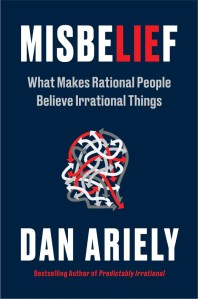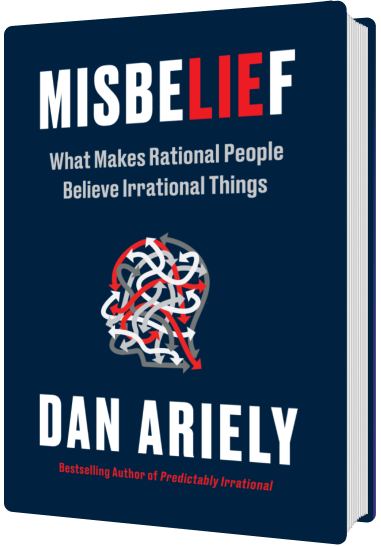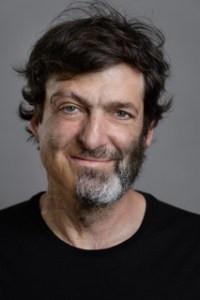About my new book, MISBELIEF
Hello hello,
I am happy to announce that on September 19, 2023, HarperCollins will be publishing my new book MISBELIEF.
In the early Covid days, I had the misfortune to experience first-hand how it feels to be brutally attacked by people who believed that Covid was a plot designed to destroy humanity. One of the results of this experience was my fascination with the process by which people adopt beliefs that are patently untrue about other individuals, the news, and institutions. This book is partly a description of the people and experiences I encountered along my journey. But mostly it’s an explanation of the psychological machine that takes people and changes them in ways that seem difficult to understand. A psychological machine I call “the funnel of misbelief.”
You can learn more about the book here and here. If you decide you want to read the book, this page includes an option to order a copy for yourself + a copy to be donated to an educator. The book can also be found at Amazon, Bookshop.org, Audible, BAM, or Barnes & Noble.
Here are some kind things that people have said:
“In this thoughtful, moving and well-written book, Dan Ariely narrates his personal and professional journey to understand the world of misbelievers and conspiracy theories, and offers insights and tips that will hopefully help all of us protect our fragile social fabric from being torn apart by disinformation and distrust.”
– Yuval Noah Harari, Bestselling author of Sapiens
“Misbelief is an urgent examination of the human attraction to misinformation. This timely book can provide a crucial foundation for building a more empathetic and informed society.”
– Daniel H. Pink, #1 New York Times bestselling author of The Power of Regret
“Once again Dan Ariely writes in a way that gets us to think and reflect about our human nature. In Misbelief, Ariely helps us understand the nature of our opinions, how they’re formed, and how the forces of misinformation can distort them. This is an important book for those who want to understand themselves and the increasingly complex world around us.”
– Arianna Huffington, Founder & CEO, Thrive Global
“For most of us it is tempting to think that people misbelieve things because they are uneducated, unintelligent, or misinformed. But as one of the world’s leading scientists studying beliefs, Dan Ariely, convincingly demonstrates in this important book (and as he discovered first hand in being wrongly accused of leading a nefarious conspiracy!), Misbelief is a process to which any of us can fall prey. More importantly, he offers science-based suggestions on what we can do about the polarization and breakdown in trust that comes with Misbelief.”
– Michael Shermer, Publisher Skeptic magazine and author of Conspiracy: Why the Rational Believe the Irrational
I hope you enjoy the book.
Irrationally yours,
Dan
Advanced Review of My New Book: MISBELIEF
David Pitt reviews my new book in this month’s edition of Booklist.
Misbelief: What Makes Rational People Believe Irrational Things.
By Dan Ariely.
Sept. 2023. 320p. Harper, $32 (9780063280427). 300.Social scientist Ariely (Irrationally Yours, 2015; Dollars and Sense, 2017) has spent years focusing on the way we often embrace ideas that are irrational, and here he turns his at- tention to misinformation specifically. Based in part on the author’s own experiences as the target of deliberate disinformation—with seemingly rational people believing lies about him—the book is an insightful examination of the underlying psychological factors that bolster misinformation’s appeal. It covers our natural tendency to accept ideas that reinforce our own beliefs (and to dismiss those that contradict them), and the way the spread of misinformation is reshaping our society. Ariely is a persuasive writer, offering plenty of anec- dotal examples to bolster his arguments and show how misinformation alters people’s lives. It’s a rigorous but also deeply compassionate book: Ariely’s goal isn’t to condemn people who fall for misinformation, but to show the reader how easy it is to believe the irrational. The book asks us to foreground empathy to reexamine some of our own beliefs. For some readers, the results could be eye-opening. —David Pitt
Full link to Booklist: https://booklist.booklistonline.com/html5/reader/production/default.aspx?pubname=&edid=6d2991a4-9d82-4321-9c01-8a678a578755
My new book MISBELIEF will be out on September 19th! You can pre-order it here https://misbeliefbook.com.
Introducing My New Book: MISBELIEF
I have a new video introducing my new book!
Or you can view it on YouTube.
The book will be out on September 19th, but you can pre-order it here https://misbeliefbook.com
Check out my latest book! Out on Sept 19th, but you can pre-order it starting today!
Check out my latest book! Out on September 19th, but you can pre-order it starting today!
MISBELIEF: What Makes Rational People Believe Irrational Things.
During the darkest early days of the pandemic, I was demonized by online misbelievers who falsely accused me of being a mastermind behind universal mask mandates and the chief engineer of the “Covid-19 fraud.” Attempts to explain my position to my attackers only escalated their vehement declarations. The experience, as disturbing and devastating as it was, inspired me to dig into the innate origins of these people’s unfounded and immovable convictions.
More generally, in recent years, we have more frequently been confronted with the outlandish conspiracy-laden misbeliefs of those around us. Even close family and friends may freely spout misinformation that gives us pause. Under the right circumstances, anyone can become a misbeliever.
In this book, I analyze the psychological machinery that changes beliefs to such an extent that people no longer trust media, institutions, and health systems. The four main elements of this psychological machinery are:
- Pressure, stress, and resentment over perceived mistreatment are key emotional factors—and at the center of many misbelievers’ journeys that began during the pandemic.
- Our rational capacities can be used in highly irrational ways to form and confirm beliefs. We think we are information machines that objectively take in information, record it, analyze it, and come to logical conclusions. But nothing could be farther from the truth. We have evolved a complex, sometimes sophisticated, sometimes flawed, and sometimes downright faulty set of shortcuts for processing the often-overwhelming world we live in.
- Many of the mechanisms that draw people into the funnel of misbelief are common human characteristics. Yet not all human beings are equally susceptible. Our individual differences— our personalities—play a role. Why are some people more susceptible than others? Individual differences and certain personality traits such as patternicity, the tendency to trust one’s intuitions, certain decision-making biases, and narcissism add to the picture.
- Social forces are at work at every stage of a misbeliever’s progression. Even the slightest degree of ostracism by family and friends can loom large in the consciousness of someone who is taking their first steps into misbelief, pushing them more forcefully into the funnel. The sense of being welcomed, acknowledged, heard, respected, and praised by fellow misbelievers creates a powerful pull of belonging. Social forces accelerate misbelief, driving people to embrace more extreme positions in order to prove loyalty and gain status. Fear of social rejection or ostracism make it very hard for them to change their beliefs once again.
Even in a time when artificial intelligence can generate convincing fake news that feeds misbelief, there is hope. There are many things we can do to mitigate the problem, and there are many more things we don’t know what to do about—yet. What is certain is that the strategies to help combat misbelief will have to be rooted not in conflict, but in understanding and empathy. The sooner we recognize that this is above all else a human problem, the sooner we can become the solution to misbelief.
If you are interested in this topic, and I think that you should be, order the book here: https://misbeliefbook.com
I’m Trying Something New!
Half Beard Look
Well, it turned out I can’t claim full credit for the ‘Half Beard look’ (no patent for me). A friend of mine, who was visiting the Sigmund Freud Museum in Vienna, sent me the above Man Ray’s self-portrait, which was taken in 1943, when Man Ray was in his fifties.
Man Ray (originally: Emmanuel Radnitzky ) was an American artist who contributed to the Surrealist and the Dada movements. In reading about him I discovered that he sought to keep his personal background far from the public’s eye, even refusing to reveal he was born under a different name. Man Ray moved to Paris in 1921 and lived there until the second world war, when he returned to the States. In 1951, he returned to Paris, where he worked until his death in 1976.
“Man Ray’s self-portrait Before and After takes a humorous view. With half of his face shaved, the artist presents himself to the viewer as a sort of Dr. Jekyll and Mr. Hyde, raising question: Which side of the portrait corresponds most to the subject’s personality? It depicts both past and future events, or rather, the period of time in between that documents what has already-happened as well as that which is yet-to-come.”
Francis Naumann (art dealer, scholar, and curator specializing in Dada and Surrealist art) suggested that shaving half of his face has a connection to his Europe/USA divided identity.
Avoiding Typing – An App for That!
I have a hard time typing because of my injuries. I have tried all kinds of things over the last few years. I asked Ray to help me by writing a piece of software that helps me to record voice notes and send them over e-mail – Either as original e-mail, or as responses to e-mail.
I find it incredible useful! It’s called Vail and we just made the software available online. Note that it only works for Apple Mail on a Mac.
If you want to see it in action, look at the video in this link. Instructions for how to download the software are in the notes under the video. I hope you will find it as useful as I do.
Discussing Irrationality on the C20 Podcast
End-of-Year Alternative “Ask Ariely”
As the end of the year is approaching, I decided to post here an alternative last “Ask Ariely” column. One that is more suitable for the end of the year and hopefully provides a way to think about new beginnings…
To a wonderful 2023 to all of us.
May it be an average year: Better than 2022 but not as good as 2024
Dan
___________________________________________________
Dear Dan,
When I reflect on my life, I think that there are many things that I do out of inertia and without much thinking. I am wondering how you make such decisions? For example, how long have you been writing your ask Ariely column and how long do you plan to continue?
—Yifah
Thanks for asking. I wrote my first Ask Ariely column in June 2012, so it has been a bit more than 10 years.
Why is this a good question to ask and think about toward the end of the year? Because, this is a good time to think bout changes. In general, when we look at the decisions we make each day, most of them are not an outcome of active deliberation. Instead, they are often a repetition of decisions we have made before. We don’t usually wake up in the morning and ask ourselves whether we should stay at the same job or look for another place to work. We don’t often ask ourselves whether we should stay in the same relationship or not. We don’t often ask ourselves if we should keep the same diet, hobbies, and exercise regimen etc. But it is important to ask ourselves these questions from time to time.
A few years ago, a good friend of mine asked me if I thought he and his wife should stay married, or go their separate ways. Their relationship was rocky for years. They fought all the time the best way forward was unclear. I told him that I wasn’t sure what the right answer was for him, for his wife (let’s call her Alexis), and for their relationship (this was not exactly true, and I did have an idea for what would be best for him, I just wanted him to get to his conclusion). What I did was to ask him to consider his question from a different perspective. I asked him to imagine that they were not married, that they did not know each other, and that they had just met the day before but that by some sophisticated technology, all his knowledge about her had been downloaded to his brain along with an understanding about how their relationship would evolve over time. Basically, I asked him to imagine that everything was the same, except that they didn’t have any history of an existing relationship.
With this image in his mind, I asked him to make a decision. To pick if he would propose to her or say goodbye and never see her again? What option did my friend chose?
My friend said that in this imaginary situation he would have said goodbye. A few weeks later they separated and they are now happier and in relationships with other people. Why did I ask him to imagine this odd situation? I wanted to try and achieve a change of the framing of his decision from one that considers “stay” vs. “change” to one that is considers Option A (life with Alexis) vs. Option B (life without Alexis) on more equal footing. The problem is that the natural framing of “stay” vs. “change” gives an unfair advantage to the “stay” decision because it is simpler, it requires less change, less work, and does not make us feel that we are making a decision. It also doesn’t make us think very much about what we would risk if we made the wrong decision. Of course, staying might feel like we are not making a decision, but by staying we are making a decision. By reframing the decision as Option A vs. Option B, some of the advantages of the stay options are reduced and it becomes clearer what we really want to do. By the way, this kind of framing is rather dangerous, so be careful before you do it at home in your own life and relationships.
When I started my column in 2012, my thought was that there was a gap between what we knew about social science and the ways in which it was incorporated into our daily lives. My column was my modest attempt to shed some light on how principles from social science could be incorporated into many aspects of daily life, from picking up poop after our dogs to finding meaning at work.
Now, 10 years later my view is very different. I still think that social science has a large role to play in improving our personal lives, but I think that other important topics have emerged and many of these are more pressing. When I look at the world now, with the climate crisis, fake news, post-COVID workforce challenges, and political fragmentation, my view is that our priorities should be different and so is the role of social science.
Over the last two decades, or so, we have done a lot to get people to think about principles from social science in terms of our personal lives, and we now need to turn our attention to these larger challenges ahead of us.
So back to your question: When I made the decision to write this column 10 years ago it was absolutely a wonderful decision, and I enjoyed and learned a lot from the process. But, looking at the column as a new decision, not in terms of “stay” vs. “leave” but in terms of Option A (work more on questions related to the role of social science in our personal lives) or Option B (work more on questions related to the role of social science in our public lives), I choose to focus on Option B — the complex public challenges ahead of us.
With this I want to give a big thank you, my readers. I hope you enjoyed the column at least 10% of how much I enjoyed writing it.
Looking forward to the next year and the next chapter.
Irrationally yours,
Dan
With SALT New York | Introducing the Human Capital Factor
Here is a discussion about the importance of human motivation, human capital, and the ways to quantify it to help companies understand how important it is.
 Tweet
Tweet  Like
Like 

